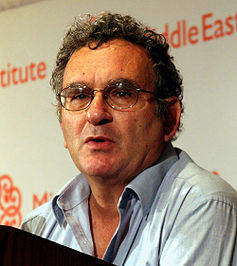Ein erstaunlicher Artikel des neuen und alten Verteidigungsministers Robert Gates, in dem er die Notwendigkeit beschreibt, die Fähigkeiten des US-Militärs zu „balancieren“.
Das ist sehr höfliche Sprache für den Bruch mit der Rumsfeld-Philosophie. Wer sich gefragt hat, warum Obama Gates gebeten hat zu bleiben, wird hier aufgeklärt.
Hier spricht ein bedächtiger Mann, der seit 42 Jahren im amerikanischen Sicherheitsapparat tätig ist und die Gefahr sieht, dass das Militär immer wieder den letzten erfolgreichen Krieg führen will – und dabei die Antizipation der neuen Gefahren vergißt.
Und mehr noch: ein Verteidigungsminister, der die Grenzen dessen erkannt hat, was man mit Gewalt erreichen kann, und selbst mit der hochtechnisierten Gewalt, bei der „in Mosul ein Truck explodiert, wenn in Nevada ein Knopf gedrückt wird“.
What is dubbed the war on terror is, in grim reality, a prolonged, worldwide irregular campaign — a struggle between the forces of violent extremism and those of moderation. Direct military force will continue to play a role in the long-term effort against terrorists and other extremists. But over the long term, the United States cannot kill or capture its way to victory. Where possible, what the military calls kinetic operations should be subordinated to measures aimed at promoting better governance, economic programs that spur development, and efforts to address the grievances among the discontented, from whom the terrorists recruit. It will take the patient accumulation of quiet successes over a long time to discredit and defeat extremist movements and their ideologies.
The United States is unlikely to repeat another Iraq or Afghanistan — that is, forced regime change followed by nation building under fire — anytime soon. But that does not mean it may not face similar challenges in a variety of locales. Where possible, U.S. strategy is to employ indirect approaches — primarily through building the capacity of partner governments and their security forces — to prevent festering problems from turning into crises that require costly and controversial direct military intervention.
Das ist die finale Absage an die Strategie des regime change, für die Bush stand, der Gates angeheuert hat, nachdem es im Irak nicht mehr weiterging.
Gates fordert auch eine Aufstockung des Etats des State Department, um die Diplomatie zu stärken, sowie der Entwicklungshilfe. Ein Verteidigungsminister, der Entwicklungshilfe als Teil der Sicherheitsstrategie ansieht, das ist mal was Neues. Und das bei einem ehemaligen CIA-Mann!
I have learned many things in my 42 years of service in the national security arena. Two of the most important are an appreciation of limits and a sense of humility. The United States is the strongest and greatest nation on earth, but there are still limits on what it can do. The power and global reach of its military have been an indispensable contributor to world peace and must remain so. But not every outrage, every act of aggression, or every crisis can or should elicit a U.S. military response.
We should be modest about what military force can accomplish and what technology can accomplish. The advances in precision, sensor, information, and satellite technologies have led to extraordinary gains in what the U.S. military can do. The Taliban were dispatched within three months; Saddam’s regime was toppled in three weeks. A button can be pushed in Nevada, and seconds later a pickup truck will explode in Mosul. A bomb dropped from the sky can destroy a targeted house while leaving the one next to it intact.
But no one should ever neglect the psychological, cultural, political, and human dimensions of warfare. War is inevitably tragic, inefficient, and uncertain, and it is important to be skeptical of systems analyses, computer models, game theories, or doctrines that suggest otherwise. We should look askance at idealistic, triumphalist, or ethnocentric notions of future conflict that aspire to transcend the immutable principles and ugly realities of war, that imagine it is possible to cow, shock, or awe an enemy into submission, instead of tracking enemies down hilltop by hilltop, house by house, block by bloody block. As General William Tecumseh Sherman said, „Every attempt to make war easy and safe will result in humiliation and disaster.“
Und den letzten Absatz muss ich dann mal übersetzen, weil er so bemerkenswert ist:
„Aber niemand sollte je die psychologische, kulturelle, politische und menschliche Diemnsion des Krieges unterschätzen. Krieg ist unvermeidlicher Weise tragisch, ineffizient und ungewiß, und es ist wichtig, skeptisch zu bleiben gegenüber Systemanalysen, Computermodellen, Spieltheorien oder Lehren, die etwas anderes suggerieren. Wir sollten uns hüten vor idealistischen, triumphalistischen oder ethnozentrischen Vorstellungen künftiger Konflikte, die die unveränderbaren Prinzipien und die hässliche Wirklichkeit des Kriegs zu transzendieren versuchen, die glauben es sei möglich, einen Gegner in ehrfürchtige Unterwerfung zu nötigen durch eine „Schock“-Taktik, statt Feinde von Hügel zu Hügel jagen zu müssen, Haus um Haus und Block um blutigen Block. Wie General William Tecumseh Sherman sagte: ‚Jeder Versuch, den Krieg leicht und sicher zu machen, wird in Demütigung und Desaster enden.'“
Bemerkenswert, oder? Limits, tragic, humility, modest, ugly realities – wie lange hat man das schon nicht mehr gehört von einem der „masters of war“?




